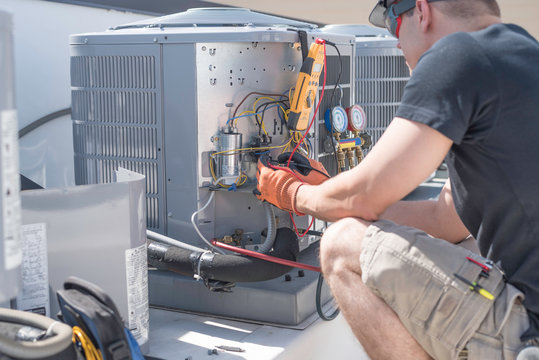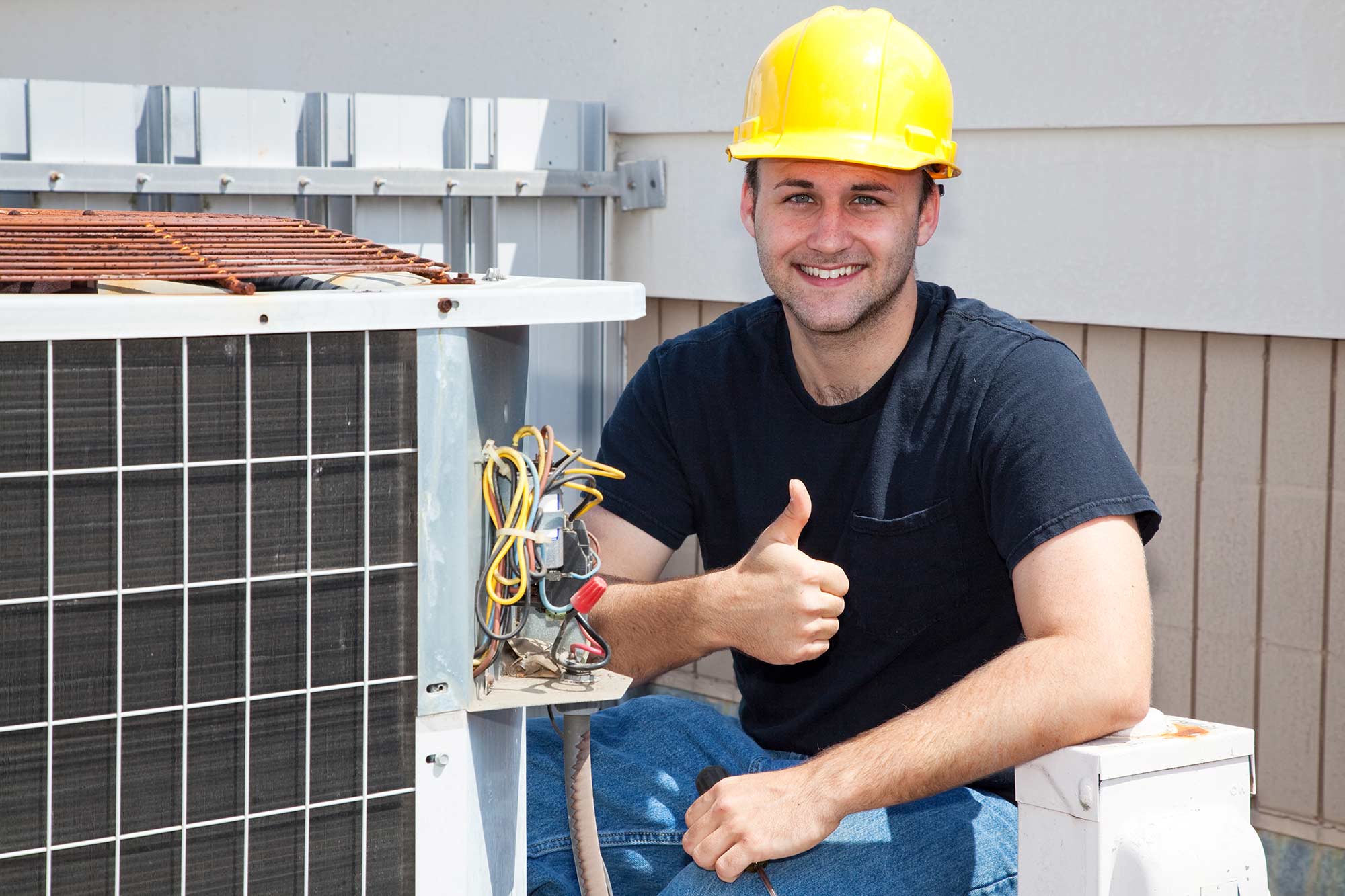Everything about Cooling And Heating: Identifying Common Issues and Effective Air Conditioning Repair Service Approaches
Cooling and heating systems are important for keeping indoor comfort. Comprehending their parts and capability is important for determining usual concerns. Homeowners often face issues such as inadequate air conditioning, strange odors, or increasing energy prices. These indications can indicate underlying issues that may call for attention. Exploring do it yourself troubleshooting methods can be beneficial, however understanding when to seek specialist help is equally essential. What steps can be required to guarantee long-lasting efficiency?
Understanding Your Heating And Cooling System: Elements and Capability
An a/c system, frequently thought about the foundation of interior environment control, includes several key parts that collaborate to control temperature level and air quality. The primary aspects include the heating unit, ventilation system, and cooling system. The home heating device, generally a furnace or central heating boiler, produces warmth throughout colder months, while the cooling system cools down interior areas during the summer season.

Common HVAC Troubles Home Owners Encounter
Homeowners often encounter numerous usual HVAC troubles, including inconsistent temperature level distribution throughout their space. In addition, unusual sounds during procedure can suggest underlying issues that call for attention. Dealing with these issues quickly is important for maintaining ideal system efficiency.
Irregular Temperature Circulation
Several families experience the discouraging issue of irregular temperature level distribution, where particular spaces feel annoyingly warm while others remain too cold. This problem usually develops from a range of factors, consisting of poor insulation, obstructed vents, or an incorrectly sized HVAC system. When air ducts are not effectively sealed or when furnishings obstructs air movement, some spaces may get insufficient air conditioning. Additionally, thermostat positioning can greatly influence temperature level law; a thermostat located in a sunlit location may misstate the overall temperature level of your home. Routine upkeep, including cleansing filters and ensuring ductwork is clear, can assist reduce these discrepancies. House owners might likewise take into consideration zoning systems to better control temperature levels throughout various areas of the home, advertising an extra comfortable living atmosphere.
Uncommon Sounds Throughout Operation
When an a/c system operates, uncommon noises can suggest underlying issues that need attention. Home owners may experience a variety of noises, such as grinding, squeaking, or hissing. Grinding noises typically indicate damaged bearings or elements, while squeaking can suggest loosened belts or parts needing lubrication. Hissing may suggest a cooling agent leakage, which can compromise the system's effectiveness. Furthermore, banging noises could indicate loose ductwork or an issue with the blower fan. Each of these noises functions as a caution, triggering home owners to investigate further. Disregarding these indications can cause even more significant problems and expensive fixings. Routine upkeep and prompt attention to unusual sounds can boost system long life and efficiency, making certain a comfy living setting.
Indicators That Indicate Your Air Conditioner Demands Repair Work
How can one inform if their air conditioning device requires repair work? Several indications may show underlying problems requiring expert attention. Initially, if the a/c fails to cool down the space properly, it may recommend a refrigerant leakage or compressor malfunction. Additionally, an increase in power expenses without corresponding use modifications can signify ineffectiveness in the system. Property owners should additionally be alert to unusual scents emanating from the device, which might indicate mold and mildew growth or electric problems. Additionally, if the air conditioning frequently cycles on and off, it could be an indication of a faulty thermostat or various other mechanical troubles. The existence of water merging around the unit can show a blocked drain line. Identifying these indicators early can save time and money, making sure that the a/c system runs effectively and effectively.
DIY Troubleshooting Techniques for Cooling And Heating Issues
When encountering heating and cooling issues, home owners can utilize a number of do it yourself repairing techniques to identify the problem. Key approaches include examining thermostat setups, checking air filters, and assessing water drainage concerns. These actions can help pinpoint typical breakdowns prior to looking for professional support.
Inspecting Thermostat Setups
What actions should homeowners take to ensure their thermostat setups are proper? Initially, they ought HVAC company to verify the thermostat is set to the desired temperature and mode, whether heating or air conditioning. Looking for a clear screen and validating the thermostat is not set to "hold" or "getaway" setting is necessary. Home owners must likewise verify that the thermostat is degree and set up in a place devoid of drafts, straight sunlight, or various other temperature affects. Furthermore, altering the thermostat can aid give exact analyses. If the thermostat operates batteries, replacing them may resolve any kind of concerns. By methodically examining these elements, property owners can usually recognize and remedy thermostat-related issues, promoting ideal heating and cooling system efficiency.
Inspecting Air Filters
Air filters play an essential duty in preserving optimal HVAC efficiency. They trap dust, irritants, and various other bits, guaranteeing tidy air flow. In time, filters can become stopped up, decreasing air flow and performance. To check air filters, individuals should initially locate the filter, frequently located in the return air duct or near the heater. When situated, they ought to review the filter's problem-- if it appears unclean or tarnished, it likely demands replacement. The majority of filters need transforming every 1-3 months, depending upon use and environmental aspects. Regular assessment and prompt replacement of air filters not only boost air high quality yet also prolong the lifespan of cooling and heating systems, preventing prospective malfunctions and costly repairs.
Assessing Drainage Issues
How can house owners effectively determine and deal with drain problems within their heating and cooling systems? First, they must evaluate the condensate drainpipe line for clogs or clogs, which can bring about water buildup. Home owners might use a wet/dry vacuum cleaner to remove any debris blocking the line. Next, checking the drainpipe pan for corrosion or leaks is vital, as a harmed frying pan can trigger water to overflow. Regular cleaning of the drainpipe line with a blend of vinegar and water helps protect against future obstructions. Furthermore, making certain correct incline of the drain line promotes efficient water flow. If these do it yourself techniques do not fix the concern, seeking advice from an expert HVAC specialist may be necessary to stay clear of prospective water damages and system failing.
When to Call an Expert for Air Conditioning Repair Work

While some AC issues can be taken care of with do it yourself approaches, there are scenarios where calling an expert comes to be crucial. Home owners should look for expert support when they run into persistent problems, such as poor air conditioning, odd noises, or uncommon smells emanating from the unit. These signs and symptoms might indicate much deeper issues that call for specialized knowledge and tools to diagnose and fix properly.

Preventative Upkeep Tips for A/c Long Life
Regular preventative maintenance can considerably improve the long life of a/c systems. Home owners need to set up annual inspections by licensed service technicians to assess system effectiveness and determine potential problems. Routinely transforming or cleaning air filters is essential, as this assurances proper airflow and reduces stress on the system. Furthermore, checking and securing ductwork avoids energy loss and boosts general efficiency.
It is additionally a good idea to keep the exterior system clear of particles and greenery, permitting peak airflow and warmth exchange. Homeowners need to evaluate the condensate drainpipe for blockages to avoid water damages and mold and mildew growth. Maintaining ideal thermostat setups and utilizing programmable choices can improve energy performance. Finally, documenting maintenance activities aids track solution background and can assist in recognizing repeating problems (air conditioner repair). By adhering to these preventative actions, people can make the most of the efficiency and life expectancy of their a/c systems
Often Asked Concerns
Exactly how Often Should I Change My A/c System Filters?
Cooling and heating system filters should generally be replaced every one to 3 months, depending upon usage, filter type, and environmental aspects. Normal substitute helps maintain performance and air high quality, making certain peak system performance throughout the year.
What Dimension Heating And Cooling System Do I Required for My Home?
To identify the appropriate heating and cooling system size for a home, one must think about square footage, insulation high quality, and regional climate. Consulting an expert can assist guarantee optimal efficiency and comfort for the specific living room.
Are There Eco-Friendly Cooling And Heating Options Available?
Yes, environmentally friendly cooling and heating alternatives are readily available, consisting of energy-efficient warm pumps, solar-powered systems, and geothermal home heating. These options decrease power usage and ecological influence, advertising sustainability while maintaining reliable climate control for household and industrial rooms.
Just How Can I Enhance My heating and cooling System's Power Performance?
To boost heating and cooling energy efficiency, one can consistently maintain the system, seal air leakages, install programmable thermostats, make use of energy-efficient filters, and warranty ample insulation throughout the home to decrease power usage and enhance efficiency.

What Is the Ordinary Life-span of a Cooling And Heating System?
The ordinary lifespan of a heating and cooling system normally varies from 15 to 25 years, depending upon variables such as upkeep, usage, and the high quality of installment. Normal maintenance can greatly extend its operational long life.
Conclusion
In summary, an extensive understanding of HVAC systems empowers home owners to recognize typical issues and address small issues efficiently. Acknowledging signs of breakdown, employing DIY fixing techniques, and focusing on routine maintenance can enhance system efficiency and performance. When faced with complex repairs, getting specialist help is essential to ensure safety and long life. By fostering recognition and positive treatment, people can take pleasure in a comfortable indoor environment while decreasing unforeseen costs linked with HVAC failings.